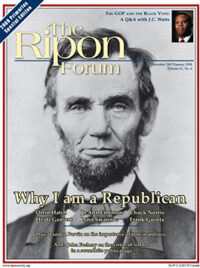What’s a Northeast Republican to do?
by JOHN MCLAUGHLIN
All during the 2006 campaign, our Republican candidates for U.S. Senate, Congress and local offices knew that they were headed for the worst election for Republicans since Watergate.
With every poll last year, we knew that the Iraq war was the defining issue of the election. As support dropped for the war, and raised the President’s unfavorable ratings, it created a catalyst for Democrats to win. Certainly there were other issues: a broken immigration system; out of control spending and corruption in Congress. All of these issues defined a failure by the Republican majority in Congress, but none was more problematic than the war in Iraq.
Our November 7, 2006 national post election survey of 1,000 voters showed that the damage was particularly acute in the Northeast (New England and Middle Atlantic States). Just two years ago on the national level, in our 2004 post election poll, affiliated Republicans outnumbered Democrats 44 percent to 40 percent, but in 2006 Democrats outnumbered Republicans 42 percent to 39 percent. In the Northeast in 2004 Republicans outnumbered Democrats 44 percent to 39 percent, but last year Democrats now led affiliated Republicans 43 percent to 40 percent. In the lower turnout of the midterm elections two results clearly occurred. First, a significant number of Republicans were so disgusted they did not vote. Second, some voters who in 2004 thought of themselves as Republicans had now left the party.

In 2006, support for the war among Northeast voters plummeted 12 points, to 41 percent, while opposition rose 13 points to 58 percent — a 24 point turnaround.
The 2006 election was a 5 to 4 vote against the war. Nationally, voters opposed the war 52 percent to 45 percent. Just two years before, the country supported the war 53 percent to 44 percent. Now it was reversed by 16 points. In the Northeast it was an even more distressing turnaround. In 2004 the Northeast voters supported the Iraq War 53 percent to 45 percent. In 2006, support for the war among Northeast voters plummeted 12 points, to 41 percent, while opposition rose 13 points to 58 percent — a 25 point turnaround.
With the drop in support for the war, also went the President’s approval ratings. In direct correlation with public opinion’s support for the war in 2004 voters had approved of the job President Bush was doing 54 percent to 45 percent. In the Northeast in 2004 the President’s approval rating was a net positive 52 percent to 46 percent.
By 2005 the President’s approval rating became a net negative nationally 46 percent approved and 53 percent disapproved. In the Northeast it was 45 percent approved and 54 percent disapproved.
In the midst of this shift on the polarizing issue of the electorate, there was also a direct correlation between the voter’s attitude toward the war and their vote for Congress. Among voters who opposed the war they voted Democratic for Congress 83 percent to 15 percent. Those voters who supported the war voted Republican for Congress 79 percent to 20 percent. So if you knew whether the voter supported or opposed the war you had an 80 percent chance that you could predict their vote for Congress.
Nationally while Republicans had split their vote virtually evenly in 2004, last year they voted Democratic 54 percent to 45 percent — a national 8 point drop for Republicans. However, once again it was more pronounced in the Northeast. In 2004, Northeast voters preferred Republicans 51 percent to 44 percent. Last year, they chose Democrats for Congress 56 percent to 43 percent. This was a 19 point overall reversal against the Republicans, which made it the worst region in the nation for the GOP.
When we asked the 2006 voters: “Regarding your vote for Congress, was it more in support of, or in opposition to the War in Iraq? If your vote was based on other issues, just say so.” Only one in four of all voters, 22 percent across the nation, said that their vote was a vote in support of the war. Four in ten voters, 42 percent, described their vote as a vote against the war. One in three voters, 32 percent, claimed they decided their vote on other issues. In the Northeast, 23 percent voted to support the war, while almost half — 48 percent — said they voted to oppose the war. Those who said their vote was to oppose the war voted at an eight to one ratio for the Democrats — 88 percent to 11 percent.
Outlook for 2008
The 2006 election is history. The war in Iraq has been the dominant issue in the previous two national elections and certainly it will be an important part of the November 2008 election. But Republican incumbents did survive the anti-war tsunami.
In our work for incumbents who faced strong Democratic challengers we found that as we defined our candidate’s incumbency on a broader agenda, they were more likely to win. Nationally, those who decided their vote on issues other than the war voted Republican 58 percent to 40 percent.
Also, whenever possible, if we could counter Democratic attacks on the war by defining our Democratic opponents as wrong on that same agenda, it really undermined the Democratic attack on the war.
Basically we were fighting over a narrow middle segment of the electorate that was heavily independent and had no allegiance to either party. In this year’s polls we are seeing the same opportunity, with about 6 in 10 independents undecided in their generic choice for Congress.
So what has changed about the War in Iraq as an issue?
America might be winning.
Americans don’t like war, but what they hate more is losing a war, especially at the sacrifice of precious American lives.
In 2004 President Bush and the Republican won the national elections precisely because the majority of Americans believed that his policies against terror, on the war and for the post-9/11 economy had been successful. However, by 2006 the plurality of Americans thought we were losing the war. As such, the majority of voters cast their ballots against losing.
The difference now is that American opinion appears to have shifted to give the President enough time to allow his policies to succeed. This cross pressures the Democratic candidates with a base that was overwhelmingly anti-war and currently favors a relatively immediate pullout.
The difference now is that American opinion appears to have shifted to give the President enough time to allow his policies to succeed.
The Republican base was never really anti-war, they just became discouraged by the time and toll the war was taking. In campaign focus groups, liberal Democrats would say that they were opposed to the war. “We should never have invaded Iraq, period,” some stated. “The President lied about weapons of mass destructions to get us into Iraq,” others declared.
In contrast, Republicans did not complain about the war itself. Rather their focus group comments would go along the line of reasoning as follows: “We were right to go into Iraq, but we should have left by now.” Republicans and Independents who supported the President and the war were disillusioned that we would “lose” the war.
So what are we seeing in current polls that look at the war as an issue for 2008? Our major findings of recent surveys in the Northeast generally find the following:
- The war is part of an election agenda which includes energy costs, the economy, health care, terror, immigration, taxes and spending. As long as the “surge” succeeds and eventually Iraq becomes stable, the war will not be the Democratic silver bullet as it may have been in 2006.
- As economic concerns rise, three in four voters still think that the country is headed in the wrong direction, but this time Democrats and Congress share the blame with Republicans.
- The President remains largely unfavorable, but the Republican Party is in the midst of a great volatile nomination battle that will redefine its image and its coalition.
- As unpopular as the President may still be, Hillary Clinton is not far behind. Nationally four in ten voters are unfavorable to her and they are polarized along partisan lines. No way is Mark Penn, Hillary’s pollster correct that she will get 25 percent of the Republican women vote. Her negatives among Republican women are about 80 percent — even in the Northeast. Last November among Northeast voters, even before the campaign started Senator Clinton had a 41 percent unfavorable rating. For every ad that a Democrat attacks a Republican with, there may be one to put some distance between the Democrat and Senator Clinton. Senator Clinton, as the nominee of her party, will be a catalyst for a better Republican turnout than in 2006. Also she will be a cause for ticket-spitting for Congress. Among those voters who may vote for her, a sizable segment do not want her to rule with unchecked control of government and will split their ticket as they did with her husband in the ’94, ’96 and ’98 elections.
- If Senator Obama wins the nomination, the Democratic Party will have gone even farther to the left and become even more anti-war. This will leave more of the middle and independent vote available to the Republicans.
- The majority of voters in the Northeast are now giving the “Democratic majority in Congress” a net negative job rating. This holds true among independents and even among Democratic voters in key swing districts. Along with the Democratic majority, Speaker Nancy Pelosi now has a net unfavorable rating in key districts.
- Democratic efforts to push a tax increase on middle-class and upper middle-class economy are undermining the Democrats credibility that they are actually cutting taxes for the middle class.
- In key districts, the majority of Northeast voters support a gradual withdrawal of troops from Iraq and are opposed to an immediate withdrawal that leaves an unstable Iraq.
- Democrat missteps fueled by New York Governor Spitzer’s very unpopular proposal to give illegal aliens drivers’ licenses and the tacit support by Senator Clinton gave Northeast Republicans an important wedge issue to regain lost ground on security as an issue.
As long as the “surge” succeeds and eventually Iraq becomes stable, the war will not be the Democratic silver bullet as it may have been in 2006.
- Last November six in ten voters, 59 percent preferred “smaller government with fewer services”, over “larger government with many services”, 28 percent. In the Northeast the plurality of voters preferred smaller government 48 percent to 36 percent. Fiscal conservatism will be an important opportunity once again for Republicans.
- With the retirement of incumbents and the opportunity for new challengers the Republican Party once again has the opportunity to become the party of new ideas, new faces and change precisely at a time when voters will be looking for independence and change once more.
The 2006 election is history and we should learn from it. The 2008 election can be an election of opportunity rather than an election of decline. The changes are coming.
John McLaughlin is the CEO/Partner of McLaughlin & Associates.




